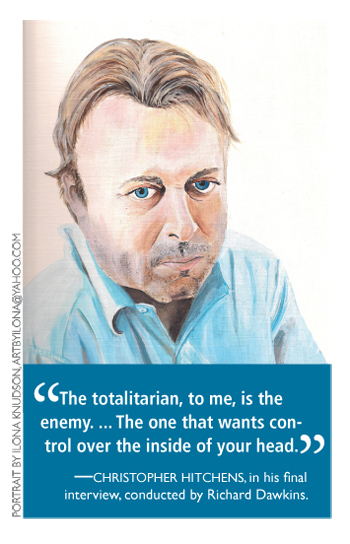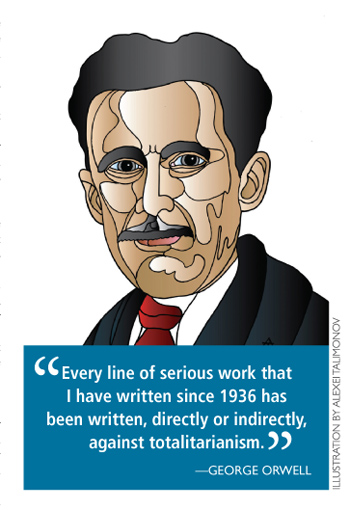Prick the Bubbles, Pass the Mantle: Hitchens as Orwell’s Successor
 © Okea | Dreamstime.com/Photo modified
© Okea | Dreamstime.com/Photo modified He is often called Orwell’s heir because of his fervent love for the writer. In the end, Christopher Hitchens was the most important Orwellian thinker since Orwell.
When looking back on the life of the late Christopher Hitchens, one sees that his persona is oddly like that of Oscar Wilde’s character Lord Henry Wotton from The Picture of Dorian Gray: loved by an assortment of people for assorted reasons, often when they cannot square with him on something else. Like Wotton, Hitchens was popular with individuals, not because they agreed with him, but because they disagreed with him. When faced with the cultivated erudition, wit, conviction, and eloquence such that “Hitch” displayed, peacocking before a podium or a writer’s desk, one couldn’t help but fall like those in Dorian Gray who despised the hedonist Wotton, and yet couldn’t stay away from his conversation.

It’s hard to say where Hitchens’ greatest popularity lies, but much Hitch-love comes from his status as the successor to George Orwell. Orwell’s manner, if anything, was the opposite of Hitchens’ strut. But the two are compared because they both criticized the Left from within on matters of international policy, albeit in independent ways. Hitchens broke from the Left over the so-called war on terror, quitting his literary homestead, The Nation, and making particularly derisive comments about his comrades. These actions were viewed as the strongest individual leftist dissent by a writer since Orwell’s infamous break over the Spanish Communists and the Soviet Union. To boot, Hitchens offered strong, vocal admiration for the elder English author and polemicist, and invoked Orwell on matters of principle and ethics regarding his own conservative turn. Indeed, the two are similarly noteworthy for their incorporation of morals into their politics.
Nevertheless, does all or any of this suffice to anoint Hitchens the inheritor, not of Orwell’s work, but of Orwell’s pen? The idea certainly has its critics. In his obituary on Hitchens, the New Statesman’s editor Jason Cowley argued that many of the comparisons made between the two are false. And although it’s popular to identify Hitchens with Orwell, the only serious, fleshed-out argument for exactly how the younger furthered the elder’s work that I’ve seen is from the Orwell scholar John Rodden, whose excellent essay on the topic appeared in The Kenyon Review in 2004. Rodden considers the idea thoroughly and concludes that there was “an intellectual passing of the torch between the two men,” and that Hitchens viewed his break with the Left as what Orwell would have done, although Rodden writes that the comparisons were too simplistic and he had reservations about such phrasings of inheritance.
However, the connection is a very useful way, if not the best way, to understand Hitchens’ importance—one that hasn’t been properly discerned. Because Hitch didn’t just follow Orwell in similarities over leftish dissent. What he did was to further Orwellian work on the totalitarian, namely by showing the importance of overcoming tyrannies held over the individual through a lack of robust criticism. This, along with his exceptional personality, is why Hitchens will be remembered and studied, because it takes the idea of the totalitarian to the next level, treating the concept as more sublime than is often believed. “The totalitarian, to me, is the enemy,” Hitchens said in his final interview, conducted with Richard Dawkins and published in the December 2011 New Statesman. “The one that’s absolute, the one that wants control over the inside of your head, not just your actions and your taxes. And the origins of that are theocratic, obviously. The beginning of that is the idea that there is a supreme leader, or infallible pope, or a chief rabbi, or whatever, who can ventriloquize the divine and tell us what to do.”
 “The totalitarian” is a baggy term in that it refers to the worst—the total—form of oppression conceivable. Hence, it usually refers to dystopian, dictatorial governments. Hitchens’ summary was that Orwell was correct on imperialism, fascism, and Stalinism; in other words, he recognized a common totalitarian bond. Articulating his looser conception of the totalitarian in his 1946 essay, “Why I Write,” Orwell states: “The Spanish war and other events in 1936-37 turned the scale and thereafter I knew where I stood. Every line of serious work that I have written since 1936 has been written, directly or indirectly, against totalitarianism and for democratic socialism, as I understand it.”
“The totalitarian” is a baggy term in that it refers to the worst—the total—form of oppression conceivable. Hence, it usually refers to dystopian, dictatorial governments. Hitchens’ summary was that Orwell was correct on imperialism, fascism, and Stalinism; in other words, he recognized a common totalitarian bond. Articulating his looser conception of the totalitarian in his 1946 essay, “Why I Write,” Orwell states: “The Spanish war and other events in 1936-37 turned the scale and thereafter I knew where I stood. Every line of serious work that I have written since 1936 has been written, directly or indirectly, against totalitarianism and for democratic socialism, as I understand it.”
Orwell linked the threat of totalitarianism brilliantly to language in a number of such essays and in the totaling idea of Newspeak, the fictional language in his novel Nineteen Eighty-Four. He showed that totalitarianism not only affects people’s ability to express themselves and communicate through language, but controls their heads, and consequently how people think. This is achieved by clouding people’s minds, the worst scenario being with Newspeak, whereby certain thoughts are not only unobtainable but are impossible. Newspeak succeeds by slowly replacing words with others and limiting those in circulation. “These truths are self-evident” is an example Orwell provides of a thought that would be impossible in the Party’s Newspeak.
Because language is a vehicle for thought (arguably the most important one), Orwell contended that misused language, or any language presented badly, obfuscates the ability to think and reason. In “Politics and the English Language,” he provides numerous examples of misuse, such as stale and dying metaphors that evoke little response from the mind or are used sometimes without knowledge of the original meaning. Ready-made phrases come in for critique as well: “It is easier—even quicker, once you have the habit—to say In my opinion it is not an unjustifiable assumption that than to say I think,” Orwell writes [emphasis his]. Saying a painter is great because her work has so much “life” in it is another such short cut.
To Orwell, politically inspired language was the worst for its subversion, intentional or not. In the same essay he wrote, “political language has to consist largely of euphemism … Defenseless villages are bombarded from the air, the inhabitants driven out into the countryside, the cattle machine-gunned, the huts set on fire with incendiary bullets: this is called pacification… People are imprisoned for years without trial, or shot in the back of the neck or sent to die of scurvy in Arctic lumber-camps: this is called elimination of unreliable elements.” This kind of wordplay, he points out, bleeds away clear images of the subject and dulls the imagination. As such, it’s a way of controlling people’s heads.
Hitchens’ extension of this worry about totalitarian influence in language and argument rests in his polemical choices, namely his character and topical attacks. Although he criticized many different people in personal demolition jobs, the most significant were figures highly regarded by almost everybody else. In an oft-quoted statement from a 1993 interview on Booknotes where he was promoting his book, For the Sake of Argument, Hitchens said:
For a lot of people, their first love is what they’ll always remember. For me it’s always been the first hate, and I think that hatred, though it provides often rather junky energy, is a terrific way of getting you out of bed in the morning and keeping you going. If you don’t let it get out of hand, it can be canalized into writing. In this country where people love to be nonjudgmental … there are an awful lot of bubble reputations floating around that one wouldn’t be doing one’s job if one didn’t itch to prick.
The problem Hitchens wished to address was the same as Orwell’s: enshrining people or ideas—the “bubble reputations” so detrimental to clear thinking.
An incident just after the first Gulf War crystallizes this simple teaching. Hitchens had been part of the anti-totalitarian Left in the tradition of Trotsky and Orwell; Hitch—a darling boy in red whom the ideologically minded felt they could trust. But he morphed into their jaded love from yesteryear as a supporter of wars that would bring down dictatorships. In 1982 he was one of the sole supporters on the Left for military intervention in the Falkland Islands. Of course it’s horrific, he argued, but it will help end the Argentinean military dictatorship. In the 1990s he supported NATO’s action against Milošević’s Yugoslavia for the same reasons. But with Operation Desert Storm Hitchens glowed leftish-rubicund in his denouncement of U.S. imperialism. The reason he deterred from his usual stance, as he declared later, was his hatred of George H.W. Bush. As Reagan’s vice president, Bush presided over the administration responsible for the Iran-Contra affair. This riled Hitchens so much that when the first Gulf War came he was an emotional jack-in-the-box, ignoring his feelings about the disposing of dictatorships because it was a Bush initiative.
Hitchens’ revelation came when he was driving with Kurdish guerillas immediately after the war. The guerillas had plastered a picture of Bush on their car’s windshield, which Hitchens asked them to remove.
“And they said, quite soberly and solemnly to me, ‘No, we think we should have this picture because we think, without him, we would all be dead, and all our families would be dead, too,’” Hitchens recounted a 2005 essay published in the Common Review. “And from what I’d seen by then in that region, I thought, that’s basically morally true. I don’t have a reply to that. I don’t have a glib one and I don’t have a sound one. It’s true. So at that point my criticism of the war became this: that it had not been a regime-change war, that the slogans of liberty and justice that had been used to mobilize it had not been honored. But if they had been, I would have been in favor of it. It’s a narrow but deep crevasse to cross, and once you’ve crossed it, I’ll tell you this, you can’t go back over it again.”
Hitchens managed to put his grievances against Bush in other areas aside when considering the matter of the Gulf War, and he realized that one set of thoughts or beliefs could affect one’s thoughts and beliefs in other areas. And it is this principle that forms the basis of his infamous character criticisms, chosen purely, it would seem, for their likelihood to grate. Try as best as you can, he challenged us, to not allow one belief to squander clear thinking about another, especially in regards to those so-called bubble personalities that become protected from criticism. It’s a kind of worship whereby anything deemed negative against the topic or person, even the act of criticizing, is illicit. This is totalitarian, he warned: a control over one’s head and what can be said, creating corrosive preconceptions.
A frequent disdain for Hitchens usually includes the cry that “he even went after Mother Theresa!” in his 1995 book, The Missionary Position. Hitchens’ Orwellian response was to say, “And?” Catholic or not, the majority of people assume Mother Theresa was a saint because she’s touted as someone who gave her life for the poor. Until Hitch barked at her, this view was virtually unanimous, winning her the Nobel Peace Prize, and rendering any criticism of her distasteful. Nevertheless, she took money from Charles Keating that turned out to be stolen and then refused to return it to its original possessors, at the same time asking the judge to be lenient with the racketeer Keating. She accepted money from the dictatorial Duvaliers of Haiti and endorsed them in return, despite claiming to be apolitical. And, above all, she took millions of dollars worldwide in donations every year, and yet no accounting was ever given for where the money went; there is no evidence that she built any truly modern medical facilities with any of this money, instead sticking to stretcher beds and aspirin to suffice for pain. And yet she checked into some of the world’s costliest hospitals for her own medical needs. Her talk of suffering as a gift, Hitchens noted, was both hypocritical in this regard and contradicted what most people believe about her.
The importance of Hitchens’ point cannot be overstated: any subject can reach a state of worship at which criticism and free thought is threatened. (Orwell’s willingness to critique Gandhi on some points while praising him on others was along similar lines.) The general principle occurs more subtly as well, and should be taken further to stress that in all matters we’re capable of duping ourselves.
Hitchens changed his position concerning Iraq by coming to realize the importance of divorcing certain beliefs from others as much as possible. This led him to support the 2003 invasion and capture of Saddam Hussein. And when it emerged that evidence used in the arguments for the war had been spun politically, Hitchens continued focusing his arguments around the benefits of deposing the brutal Hussein. He could have retained this position while blasting the PR campaign vehemently, along with the war crimes that were committed. In his May 2004 Slate piece, “Prison Mutiny: What the Torturers of Abu Ghraib Have Wrought” he did provide this emblematic “Hitch-slap”: “One asks wistfully if there is no provision in the procedures of military justice for them to be taken out and shot,” but ends with: “…not a great week for the good old cause of regime change.”
I believe Hitchens never made the kinds of strong criticisms leveled against Bush Sr. because he became interested primarily in arguing against critics of the war and was concerned about preserving his humanitarian message amongst the debate and dialectic. If that’s correct, it shows, again, the importance of understanding how much power one’s thoughts have over the formation of others.
Christopher Hitchens died on December 15, 2011, never having won the Orwell Prize, awarded to those who succeed in Orwell’s stated aim “to make political writing into an art.” (He was awarded a posthumous memorial prize at this year’s ceremony in May.) Hitchens was known to dismiss claims to Orwell’s mantle by listing Orwell’s struggles both in life and as a writer, claiming no desire for either. Nevertheless, it seems that he was incredibly happy to receive such a comparison, and his love of Orwell was so strong that it would be dippy to say that he wouldn’t have felt some verisimilitude for such a title. But his personal concerns about “being one’s own thinker,” and even humbleness when comparing himself to Orwell would have been fighting with him on this. Still, Hitchens deserves the mantle of Orwell simply because his contributions to thought have been the most Orwellian since Orwell. There are many who have employed the blueprints Orwell gave us, but the simple practicality of Hitchens’ “pricking bubbles” principle, whether it be applied by voters, politicians, academics, or bon mot-spilling essayists, is one everyone, everywhere needs to know dearly. Everyone should be aware of what controls exist over their thoughts and opinions, both external and internal. It is an essential part of developing a critical mind. And in an age of increasing information, it becomes more critical by the day. To paraphrase Orwell’s protagonist Winston Smith, if there is hope, it lies within you.
